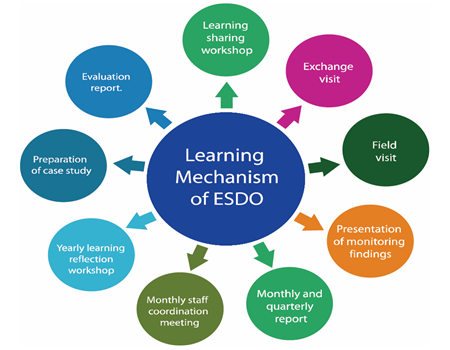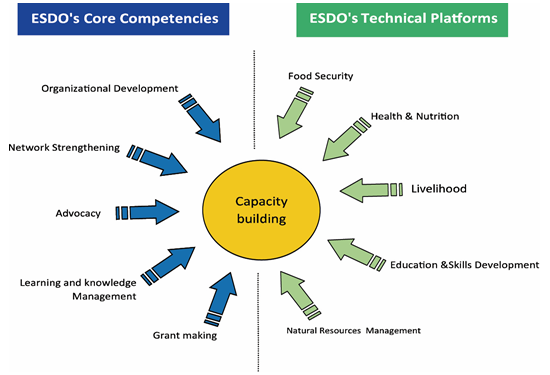- Home
- About Us
- Activities
- SDG-01: No Proverty
- SDG-02: Zero Hunger
- SDG-03: Good Health and Well-Being
- SDG-04: Quality Education
- SDG-05: Gender Equity
- SDG-06: Clean Water and Sanitation
- SDG-07: Affordable and Clean Energy
- SDG-08: Decent Work and Economic Groth
- SDG-09: Industry, Innovation and Infrastructure
- SDG-10: Reduced Inequalities
- SDG-11: Sustainable Cities and Communities
- SDG-12: Responsible Consumption and Production
- SDG-13: Climate Action
- SDG-14: Life Below Water
- SDG-15: Life On Land
- SDG-16: Peace, Justice and Strong Institutions
- Notice Board
- Wings
- Gallery
- Docs
About Us
Our Strategy
Summary of the Strategic Plan:
ESDO followed the Sustainable Development Goals (SDGs) and considering the SDG Goal we addressed in local level through different programs.
Considering the SDGs & ESDO's Vision & Mission the programming goal sets five strategic priorities towards developing pathways for ending
poverty and promoting shared prosperity in a sustainable manner. This includes:
ESDO Strategic Goals 2018-2030 (Outcomes, Targets and Strategies)
Goal-01: No Poverty & Zero Hunger (aligned with SDG-1: End poverty in all its forms everywhere and SDG-2: End hunger, achieves food security
and improved nutrition, and promotes sustainable agriculture).
Goal-02: Good Health, Clean Water & Sanitation (aligned with SDG-3: Ensure healthy lives and promote well-being for all at all ages, & SDG-6:
Ensure availability and sustainable management of water and sanitation for all).
Goal-03: Education & Technical Vocational Training (SDG-4: Ensure inclusive and equitable education and promote Life-long learning
opportunities for all and SDG-8: Promote sustained, inclusive and sustainable economic growth, full and productive employment and decent
work for all and SDG-9: Build resilient infrastructure, promote inclusive and sustainable industrialization and foster innovation).
Goal-04: Gender Equality, Child Protection & Promotion of Human Rights (SDG-5: Achieve gender equality and empower all women and girls
and Goal, SDG-10: Reduce inequality within and among countries, SDG-16: Promote peaceful and inclusive societies for sustainable
development, provide access to justice for all, and build effective, accountable and inclusive institutions at all levels.
Goal-05: Sustainable Communities, Climate Action & Promotion of Affordable Clean Energy (SDG-7: Ensure access to affordable, reliable,
sustainable, and modern energy for all and SDG-11: Make cities and human settlements inclusive, safe, resilient, and sustainable. SDG-12: Ensure
sustainable consumption and production patterns, SDG-13: Take urgent action to combat climate change and its impacts, SDG Goal 14: Conserve
and sustainably use the oceans, seas and marine resources for sustainable development, SDG Goal 15: Protect, restore and promote sustainablePage 5 of 36
use of terrestrial ecosystems, sustainably manage forests, combat desertification, and halt and reverse land degradation and halt biodiversity loss.
Goal-06: Innovation & Organizational Development.
Management Information System

Reporting System
| # | Types of Report | Interval |
| 01 | Inception Report | Within 15 days of Starting of Program |
| 02 | Monthly Report | Monthly Financial and Progress Report |
| 03 | Quarterly Financial Statements | Three Months |
| 04 | Half Annual Progress Report | Six Months |
| 05 | Annual Report | 12 Months |
| 06 | An Audited Annual Financial Report | 12 Months |
| 06 | Annual Financial Report | 12 Months |
| 07 | Project Completion Report | After Completion of Project |
M&E Matrix
| Technique of M&E | Data to be Collected | Instrument Data Collected | Frequency | Responsibility |
| Process Monitoring | Choose Observation of the all Project Activities | FGD, Impact Diagram, Process Documentation and PRA Techniques | Monthly Note for Records, Quarterly Process Monitoring Reports, Occasional Case Studies | ESDO Monitoring Team |
| Documentation of Lesson Learnt and Good Practices | Capture Learning and Documented Success Story | Field Visit Observation | Continuous Process | ESDO Monitoring Team |
| Beneficiary Assessment | Beneficiaries Attitude about the Project Services, Bottlenecks, Reason for Success or Failure, Remedy Measure Required | Workshop, Formal and Informal Consultative Meeting, Group Discussion | Quarterly | MIS Coordinator |
| Impact Evaluation | Baseline Survey, Socio-Economic Condition, Rural Institutional Development, Impact of Accessibility of the Rural Poor to Service Providers | Survey and PRA Techniques | Yearly Basis | ESDO Evaluation Team/External Evaluation Team |
| Special Studies | In-Depth Information about a Specific Issue | Sample Study, FGD, PRA, Group Discussion, Observation, Workshop | As per Requirement | ESDO Evaluation Team/External Evaluation Team |
| Field visit and Spot Checking | Activity of ESDO's Ongoing Programmed | Checklist, Group Discussion and Observation | Continuous Process | ESDO Monitoring Team |
| Monthly Progress Review Meeting | Monthly Progress Report | Prescribe Reporting Format | Monthly | Executive Director |
| Quarterly Monitoring Workshop | Quarterly Status of the Different Programmes, Problems Confronted, Lesson Learnt and Revision of Work Plan | Discussion, Prescribed Reporting Formats, Work Plan | Quarterly | ED, PC, APC & Monitoring Team |
| Quarterly Progress Report | - | Prescribed Reporting Formats | Quarterly | ESDO MIS and Monitoring Team |
Learning Mechanism  |
ESDO's Approach to Capacity Building  |
|||
Financial Management and Internal Control Framework
International Accounting Standards (IAS) is followed in account keeping and International Financial Reporting Standards (IFRS) are used in all financial reporting of ESDO. ESDO has its own transparent financial management system that’s also comply with donor’s requirements. ESDO maintain both accrual and cash basis accounting and follow the double entry accounting system. Keep accounts by software also.
The Procurement System
ESDO strictly followed ESDO's own Procurement policy. This policy states the Procurement Procedures which applies to all ESDO’s Offices (Head Office, Regional Office & Field/Program/Project/Branch Office) and employees who have either direct and/or indirect interaction with vendors, suppliers, manufacturers and individual firms or consultants.
Internal & External Audit Procedure
Internal Audit Team: For ensuring qualitative and quantitative program ESDO’s all project activities are regularly and periodically audited by ESDO’s internal audit team.
External Audit Team: In accordance with the relevant section of the constitution of ESDO, General Committee of ESDO appointed yearly basis external auditor for overall auditing ESDO’s all sorts of accounts.
Evaluation Procedure: ESDO regularly evaluated ESDO’s programs and projects through different time-frame.
Head Office
-
Address: Collegepara (Gobindanagar),
Thakurgaon-5100, Bangladesh - Phone: +880 561 52149
- Email: [email protected]
-
Saturday - Thursday: 08:30 am - 05:00 pm
Friday - Friday: Closed
Dhaka Office
-
Address: ESDO House, Plot #748, Road #08,
Adabor, Dhaka-1207, Bangladesh - Phone: +880 2 58154857
- Email: [email protected]
-
Saturday - Thurseday: 08:30 am - 05:00 pm
Friday - Friday: Closed
